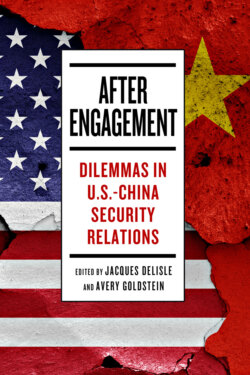After Engagement

Реклама. ООО «ЛитРес», ИНН: 7719571260.
Оглавление
Группа авторов. After Engagement
Contents
Acknowledgments
ONE. Rivalry and Security in a New Era for US-China Relations. JACQUES DELISLE. AVERY GOLDSTEIN
A RELATIONSHIP CREATED AND TRANSFORMED: NORMALIZATION AND THE ERA OF ENGAGEMENT
THE NEGATIVE TURN IN US-CHINA RELATIONS
A Shift Delayed
An Adversarial Relationship Emerges
A CHANGING DISTRIBUTION OF POWER
BEYOND CORE SECURITY ISSUES: RETHINKING DEPENDENCE AND INTERDEPENDENCE
DOMESTIC POLITICS AND BILATERAL DISCORD
TOWARD IDEATIONAL CONFLICT?
ASSESSING CONTEMPORARY US-CHINA RELATIONS: INTERNATIONAL SECURITY AND RELATED ISSUES
PROSPECTS FOR US-CHINA RELATIONS
Notes
TWO. Assessing the Dangers of Conflict. The Sources and Consequences of Deepening US-China Competition. CHARLES L. GLASER
CHINA’S MORE COMPETITIVE AND ASSERTIVE BEHAVIOR
US POLICY AS A DRIVER OF CHINA’S POLICY
CONFLICTING INTERESTS
Why the Nature of States’ Conflicting Interests Matters
Conflicting Interests between the United States and China
EXPLAINING CHINA’S INCREASINGLY COMPETITIVE/ASSERTIVE BEHAVIOR
IMPLICATIONS FOR THE FUTURE TRAJECTORY OF THE US-CHINA RELATIONSHIP AND US POLICY
Notes
THREE. China’s Contribution to the US-China Security Dilemma. ALASTAIR IAIN JOHNSTON
SECURITY DILEMMAS AS SOCIALIZATION PROCESSES
INDICATORS OF A SECURITY DILEMMA
EMPIRICAL ANALYSIS
THREAT MEMES AND NARRATIVES
Threats of (Mostly Material) Loss or Harm
Threats of Contamination and Subversion
SELF AS DEFENSIVE; OTHER AS DISINGENUOUS
CONCLUSION
Notes
FOUR. An Ideological Contest in US-China Relations? Assessing China’s Defense of Autocracy. JESSICA CHEN WEISS
A “SYSTEMS COMPETITION” IN US-CHINA RELATIONS?
A WORLD SAFE FOR AUTOCRACY? ASSESSING CHINA’S INTERNATIONAL EFFORTS AND INFLUENCE
Leading by Example—Or Exporting a China Model?
Providing Institutional Support
Providing Economic and Technological Assistance
Shaping Overseas Opinion and the Corrosion of Democratic Freedoms
CONCLUSION
Notes
FIVE. Stormy Seas. The South China Sea in US-China Relations. M. TAYLOR FRAVEL. KACIE MIURA
A BRIEF REVIEW OF KEY EVENTS IN THE SOUTH CHINA SEA
CHINA’S VIEWS ON INITIAL US INVOLVEMENT (2009–2014)
US VIEWS OF CHINESE ASSERTIVENESS (2014–2020)
Elite Discourse
China and the South China Sea in US Official Statements
CHINA RESPONDS TO US BEHAVIOR (2014–2020)
CONCLUSION
Notes
SIX. Japan and US-China Strategic Competition. In from the Beginning. MICHAEL J. GREEN
TRAPS, DILEMMAS, AND THE ROOTS OF THE CURRENT JAPAN-CHINA-US STRATEGIC TRIANGLE
ABE’S GRAND STRATEGY AND SINO-US STRATEGIC COMPETITION
JAPAN AND THE TRUMP ADMINISTRATION’S CHINA STRATEGY
Diplomatic Competition
Ideational Competition
Military
ECONOMIC COMPETITION
CONCLUSION: WILL JAPAN MODERATE US-CHINA STRATEGIC COMPETITION?
Notes
SEVEN. No Space to Hedge. US-China Competition and Its Impact on Korea. VICTOR CHA
HISTORICAL STRUCTURAL FORCES
US-CHINA STRATEGIC COMPETITION
PROPOSITIONS FOR KOREAN STRATEGIC CHOICE
SOUTH KOREAN HEDGING
NORTH KOREAN BALANCING
REVERSING THE CAUSAL ARROW?
SOUTH KOREAN TILT?
THE ROAD AHEAD: ECONOMIC NATIONAL SECURITY
CONCLUSION
Notes
EIGHT. The Taiwan Issue in US-China Relations. Sliding into a Security Dilemma? SCOTT L. KASTNER
TAIWAN AS A CONTINUED FLASH POINT FOR ARMED CONFLICT
US AND PRC DETERRENCE DILEMMAS IN THE TAIWAN STRAIT
The US Dilemma: Deterring a Taiwan Conflict while Maintaining Stable Relations with Beijing
The PRC Dilemma: Deterring Taiwan Independence while Seeking Peaceful Unification
Summary
A LOOMING SECURITY DILEMMA IN THE TAIWAN STRAIT?
CONCLUSIONS: LOOKING TOWARD THE FUTURE
Notes
NINE. US-China Relations and Chinese Military Modernization. PHILLIP C. SAUNDERS
CHINESE INTERESTS AND PLA MILITARY MISSIONS
THE LONG ROAD TO A MODERN PLA
PLA REORGANIZATION AND CAPABILITIES
REGIONAL MILITARY MISSIONS
PROTECTING CHINA’S OVERSEAS INTERESTS
US-CHINA MILITARY COMPETITION
CONCLUSION
Notes
TEN. Globalized Innovation and Great Power Competition. The US-China Tech Clash. ELSA B. KANIA. ADAM SEGAL
GLOBALIZATION OF SCIENCE AND TECHNOLOGY
ILLICIT GLOBALIZATION
THE GLOBALIZATION OF US S&T
INTERDEPENDENCE IN INNOVATION
CHANGING PERCEPTIONS
CHINA’S INNOVATION IMPERATIVE
THE UNITED STATES RESPONDS
EMERGING IMPLICATIONS OF TECHNO-STRATEGIC COMPETITION
Notes
ELEVEN. China’s Belt and Road Initiative. JAMES REILLY
ACADEMIC ADVENTURES ALONG THE BELT AND ROAD
ECONOMISTS JOIN THE GREAT GAME
BRANDING THE BRI
ORCHESTRATING THE BRI
CHINA’S COSTLY AMBITIONS
BEIJING’S REVERSE COURSE
BRI IN THE COVID ERA
CONCLUSION: A MODEST PROPOSAL
Notes
Contributors
Index
Отрывок из книги
AFTER ENGAGEMENT
Dilemmas in US-China Security Relations
.....
China responded in kind, with its own tariffs on imports from the United States. Chinese levies and shifts in purchases away from US suppliers focused on politically salient targets, such as Midwestern farmers, who had been crucial to Trump’s electoral victory. Beijing also flexed its administrative muscle to clarify that, aside from tariffs, it had other cards it could play, especially actions against US firms doing business in China. The PRC’s accelerating efforts to reduce its dependence on US suppliers in response to the trade war effectively, if unintentionally, made the decoupling sought by some in Washington more plausible. In sum, the long-prevailing belief that deepening economic interdependence was good for both parties and provided crucial ballast to a vital US-China relationship was unraveling.
Washington increasingly viewed Beijing’s economic engagement with other countries in similarly dark terms. The Trump administration, and other US critics, were skeptical about the BRI, Xi Jinping’s signature international economic policy, which pushes outbound investment in infrastructure and support for economic development across much of Asia and into Europe. They claimed the BRI was a nefarious strategy to increase Chinese political influence, using dubious tactics they labeled “debt trap diplomacy.”52
.....